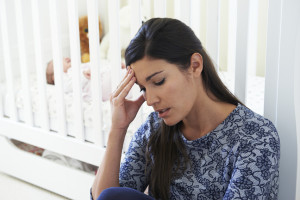The birth of a baby brings about a range of emotions-joy, relief, elation, and feelings of being overwhelmed, tired, and sometimes, depression. The hormonal fluctuations and changes after a woman has given birth is powerful, and real. Many women I work with often say, “I didn’t think taking care of a baby would be this hard.”
New moms may feel bad or guilty if they experience sadness or feel overwhelmed. It can be confusing for new moms when they think they “should” feel happy but don’t after the birth of their baby. I’ve talked with many new moms, who talk with partners, spouses and family about feeling sad, only to hear, “Why do you feel sad? A healthy baby is something to be happy about!” It can be hard for people to understand how a new mom can have feelings of sadness or depression after the birth of a baby.
A range of postpartum emotional reactions is to be expected for new moms, especially because of hormonal changes on a woman’s mental and physical functioning. Hormonal fluctuations during pregnancy, after delivery, and into the first year of your baby’s life will impact women emotionally, physically and socially. Consider the hormonal fluctuations on a continuum, from mild to moderate to severe. Most women will experience some hormonal fluctuation, the question is, in what intensity and how much?
Many women experience what’s referred to as the “baby blues”, crying spells, mood swings, as well as moments of irritability and fatigue. “Baby blues” characteristically are short-term, lasting a few days and up to two weeks and resolve quickly. In contrast, postpartum depression is more severe, long lasting and impairs a woman’s ability to function after her baby is born.
Years ago, I asked an OB/GYN to help me understand the difference between sleep deprivation because of a new born compared to postpartum depression; when a mom with sleep deprivation gets sleep, she often feels emotionally better, whereas a mom with postpartum depression will get sleep and her symptoms stay the same. Sleep is one of the most important foundations with maintaining good mental health. Why? Sleep is a great regulator of hormonal process in the body as well as balancing physical health and helping people access good coping skills to manage mental health.
Symptoms of Postpartum Depression include:
- Loss of appetite Insomnia
- Intense irritability or anger
- Overwhelming fatigue
- Loss of interest in sex
- Lack of joy in life
- Feelings of shame, guilt or inadequacy
- Severe mood swings
- Hopelessness
- Difficulty bonding with you baby
- Withdrawal from family and friends
- Thoughts of harming yourself or your baby
Mother’s who have postpartum depression may also have the following symptoms:
- Be unable to care for herself or the baby
- Be afraid to be alone with her baby
- Have negative feelings toward the baby or even think about harming the baby (these feelings can be very scary and are often not acted on. However, this should be communicated to a medical professional right away)
- Worry intensely about he baby or have little interest in the baby
Risk Factors for Postpartum Depression include:
- Personal history of depression either during pregnancy or at other times in life
- Family history of depression, anxiety or postpartum depression
- History of premenstrual dysphoric disorder (PMDD or PMS)
- Postpartum depression after a previous pregnancy
- Complications of pregnancy, birth or breastfeeding
- Mothers of multiples (twins, triplets, quads)
- Mothers whose infants are in the NICU (Neonatal Intensive Care Unit)
- Mothers who have gone through fertility treatments
- Women with thyroid imbalance
- Women with any form of diabetes
- Experiencing a stressful event during the past year, such as pregnancy complications, illness, financial problems, job loss
- Problems in your relationship with spouse or significant other
- Limited support system
- Ongoing financial problems
- The pregnancy was unplanned or unwanted
If you think you or someone you know has postpartum depression, please seek professional support and counseling. Postpartum depression is a true medical condition just like high blood pressure or diabetes. When Postpartum Depression occurs, it is a condition that requires intervention and medical treatment. Supportive counseling, medication and medical care can help mothers care for themselves and their families.
© Dr. Claire Nicogossian 2015

